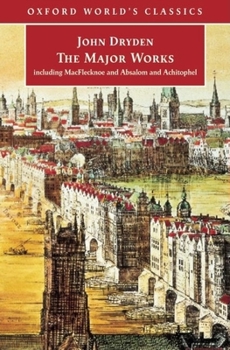The Major Works
John Dryden (1631-1700) was the leading writer of his day and a major cultural spokesman following the restoration of Charles II in 1660. His work includes political poems, satire, religious apologias, translations, critical essays and plays. This authoritative edition brings together a unique combination of Dryden's poetry and prose--all the major poems in full, literary criticism, and translations--to give the essence of his work and thinking. The collection includes the poems, MacFlecknoe and Absalom and Achitophel as well as Dryden's classical translations; his versions of Homer, Horace, and Ovid are reproduced in full. There are also substantial selections from Dryden's Virgil, Juvenal, and other classical writers. Fables, Ancient and Modern, taken from Chaucer, Ovid, Boccaccio, and Homer, his last and possibly greatest work, also appears in full.
Format:Paperback
Language:English
ISBN:0192840770
ISBN13:9780192840776
Release Date:April 2003
Publisher:Oxford University Press, USA
Length:992 Pages
Weight:1.50 lbs.
Dimensions:1.8" x 5.0" x 7.9"
Customer Reviews
3 ratings
Amazing reading
Published by Thriftbooks.com User , 17 years ago
I love this book. Dryden finds the way to write about really complicated topics in a way that is very clear (and clever).
Restoring Dryden
Published by Thriftbooks.com User , 17 years ago
John Dryden is one of those poets who everyone respects and nobody reads. His public poetry often seems out of place to modern readers as he bashes his now obscure enemies and recalls long since forgotten political events. Yet Dryden was the leading figure in British literature for a number of decades. There's a reason for this. He was the master of the heroic couplet and few figures were more influential in taking literature to the common readers. The Oxford World's Classics edition is excellent. Most of the major poems are there though "The Hind and the Panther" is excluded. This is the most personal of Dryden's poems and you simply can not understand the poet's conversion to Catholicism without it. It is as if the editors prefered to reinforce the common perception that Dryden is the least personal of poets. The introduction needs to be fleshed out and the endnotes are not accesable (they really should have included footnotes). Even worse, Dryden's plays are neglected. Still, one has to concede this is the most accesable version of Dryden out there and this redeems a great deal of its flaws.
Great Poetry, Mediocre Editing
Published by Thriftbooks.com User , 20 years ago
The blurb's claim that this edition includes all of Dryden's major original poems is not quite true. "The Hind and the Panther", the long and very important poem which marked Dryden's conversion to Catholicism, has unaccountably been left out. This omission would have made this edition worthless if there were any other affordable editions of Dryden. An irritating feature of the editing is the relentless modernisation, which obscures the metre by dropping elision markers, and spoils the rhyme by respelling "wrack" as "wreck" etc. It is doubtful whether Dryden needs modernisation at all, but it seems unlikely that spelling out "Int'rest" as "interest" or "th'offence" as "the offence" is likely to help any reader. As for the poetry. Dryden is an exceptionally readable and entertaining poet; his very natural style makes him much more accessible than Milton or Pope. Like Pope, he is a great verse satirist who writes in couplets, but the two poets are otherwise not very similar. Dryden's couplets are less close-packed or self-contained than Pope's, but they move more swiftly and are more energetic. Dryden, unlike Pope, uses the triplet quite often as an amplifying device, and many of his best lines are in triplets: "I am as free as Nature first made man, Ere the base laws of servitude began, When wild in woods the noble savage ran." "Thy generous fruits, though gather'd ere their prime Still show'd a quickness; and maturing time But mellows what we write to the dull sweets of rhyme." "A fiery soul, which, working out its way, Fretted the pygmy-body to decay, And o'er-inform'd the tenement of clay." This type of verse is fairly typical of Dryden: the statement is direct, unambiguous and forceful; in T.S. Eliot's words, "Dryden states immensely". Dryden's satire is much more like caricature than Pope's; his characters are monstrous and misshapen giants, while Pope's are amazingly realistic dwarves. This is the Dryden note: With all this bulk there's nothing lost in Og, For ev'ry inch that is not fool is rogue: A monstrous mass of foul corrupted matter, As all the devils had spew'd to make the batter. The difference is one of genre. Pope's poetry is an idealisation of the letter; Dryden's of the speech or sermon. Therefore, Pope is intimate and delicate, while Dryden is energetic and sonorous. Of course, this is a generalisation; my point is just that they are very different in their methods, and that to expect Dryden to be like Pope (or the other way around) is probably a bad way to start. Dryden is notable for much more than his satires. His religious poems are very fine; so are his translations, especially of Lucretius, Juvenal, Horace (Ode 3.29), Boccaccio and Virgil. (His version of the Aeneid is probably the best we have in English.) So are his two St. Cecilia's Day songs and the Ode on Killigrew, and especially the splendid elegy "To the Memory of Mr Oldham". And his critical essays, from the "Essay on Dramatic Poesy" to the preface t





